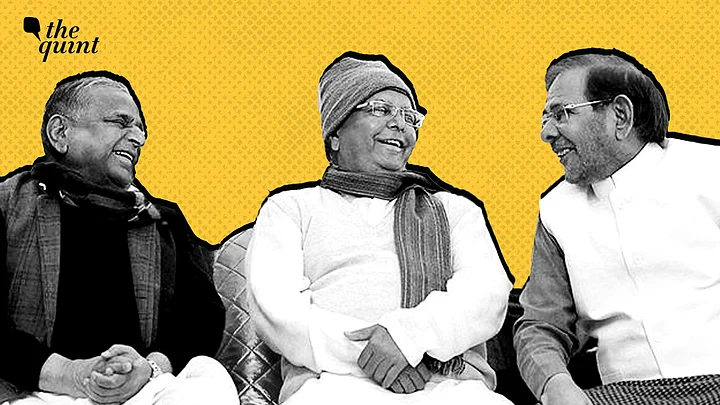The death of socialist stalwart Sharad Yadav at the age of 75 not long after the demise of Mulayam Singh Yadav marks the fading of a political era of the era.
Inspired and nurtured by Indian socialist icons Ram Manohar Lohia and Jayprakash Narain, the two along with Lalu Prasad— currently ailing in a Singapore hospital, represented a remarkable Yadav triumvirate that dominated North Indian politics by triggering the rising clout of backward castes and the middle peasantry.
Sharad Yadav’s People Skills Catapulted His Political Career
Paradoxically, while Sharad Yadav certainly lacked the mass political charisma of his two compatriots, he had a far more spectacular advent in national politics almost half a century ago.
After a promising stint in socialist student politics in Madhya Pradesh, he was chosen by Jayprakash Narain himself as the joint Opposition candidate in a Lok Sabha by-election from Jabalpur in 1974 and won, thus, giving a huge boost to the emerging alliance of political parties against the then Prime Minister Indira Gandhi and the ruling Congress party.
Within a year, the 27-year-old MP— one of the youngest in the Parliament was in jail arrested under the draconian Maintenance of Internal Security Act (MISA) along with hundreds of Opposition leaders incarcerated after the imposition of Emergency.
In 1977, when a combined Opposition routed the Emergency regime in a Lok Sabha poll called by Mrs Gandhi in a gamble that backfired, Sharad Yadav once again contested and won from Madhya Pradesh.
He would swiftly become one of the rising young political stars of the newly formed ruling Janata party, showing great skill in winning friends and influencing people across the political spectrum. Quite amazingly, he also managed to shift his politics entirely from his home state of Madhya Pradesh first to Uttar Pradesh and then to Bihar as his political arena – a shrewd calculated decision considering that Yadavs comprised a dominant community in the two states.
Sharad Yadav Mobilised Backward Classes with Mandal Politics
In 1979, when peasant Patriarch and Home Minister Charan Singh split away from the Janata Party forming the Lok Dal and became Prime Minister briefly with Congress support, Yadav became the national general secretary of the new party.
Nearly a decade later, he played a key role in the founding of the Janata Dal led by VP Singh who inducted him into the cabinet as Textiles and Food Processing Industries Minister. With VP Singh announcing the controversial Mandal Commission reservation policy for backward castes which led to his government’s downfall, Yadav along with Mulayam Singh, and Lalu Prasad became the main torchbearers of what came to be known as 'Mandal politics'.
While his two Yadav compatriots concentrated on building up their regional profile in Uttar Pradesh and Bihar, Sharad Yadav concentrated on national politics as general secretary and chairman of the parliamentary board of the Janata Dal from 1989 to 1997 and later elevated to being the party president.
Adept at political negotiations, he played a key role as Janata Dal president to work out an alliance in 1999 with the Atal Bihari Vajpayee-led BJP and with the help of George Fernandes and Nitish Kumar, laid the foundation of a new party Janata Dal (United) that became part of the BJP-led National Democratic Alliance. Later, the BJP and JD(U) would go on to form a coalition state government in Bihar ousting Lalu Prasad and replacing him with Nitish Kumar.
The relations between Lalu Prasad and Sharad Yadav would remain strained for many years with the former seeing the latter as an outside interloper in Bihar politics. Interestingly, there developed a mega battle between the two Yadavs over Madhepura constituency in Bihar that Sharad Yadav had adopted as his home constituency.
While Lalu Prasad defeated him twice from Madhepura, his old compatriot-turned-antagonist defeated him once, and the battle continued even after Laloo left the field with his party RJD doing its best to defeat Sharad Yadav, failing once but succeeding the next time.
Conflict & Camaraderie Defined the Lalu-Sharad Jodi
Yet in the last few years, the two had grown close once again. Having supported the decision by Nitish Kumar to snap ties with the NDA after Narendra Modi became Prime Minister in 2014 on the plea of the BJP adopting an overt Hindutva policy, he refused to go along with the former when he returned to the BJP a few years later after a spat with Laloo Prasad and his son and successor Tejashwi Yadav.
Sharad Yadav would be vindicated some years later when Nitish once again turned against the BJP, choosing to resurrect his alliance with the RJD and make Tejashwi his deputy chief minister.
Not surprisingly, on hearing of Yadav’s demise, Lalu from his sick bed in Singapore tweeted, “ We had many disagreements and fights but never ever was there bitterness between us,” while Tejashwi spoke of how he regarded the departed leader as a “family elder”.
(The writer is a Delhi-based senior journalist and the author of ‘Behenji: A Political Biography of Mayawati’. This is an opinion piece. The views expressed above are the author’s own. The Quint neither endorses nor is responsible for the same.)
(At The Quint, we question everything. Play an active role in shaping our journalism by becoming a member today.)
